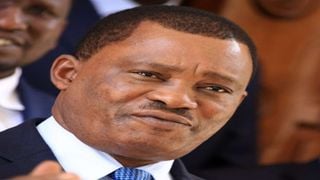
National Assembly Speaker Justin Muturi.
| File | Nation Media GroupPolitics
Premium
Muturi hints at earlier BBI vote
The country could go to a referendum earlier than projected. This emerged after National Assembly Speaker Justin Muturi yesterday said Parliament only needs three weeks at most to dispense with the BBI Bill, which is currently at the county assemblies’ approval stage.
Mr Muturi also appeared to rule out a multiple-question referendum when he said the House would adopt a Bill being fronted by the Justice and Legal Affairs Committee (JLAC), which proposes a Yes or No referendum.
If the House adopts the JLAC Bill, it will shut the door on multiple questions during the referendum, which is the option proposed by the Constitutional Implementation Oversight Committee (CIOC) – in the CIOC Bill.
Mr Muturi said since the Constitution of Kenya (Amendment) Bill, 2020 will go to the people in a referendum, the 90-day constitutional window for public participation does not need to be observed by the House.
The decision removes the biggest hurdle yet for the Building Bridges Initiative (BBI) – time – which would have pushed the referendum to as late as June if the 90-day period was observed.
The BBI team has set a March 1 deadline for county assemblies to consider the Bill. It will however require the support of at least 24 county assemblies to be tabled in Parliament.
Yesterday, Mr Muturi said upon publication and approval of the Bill by the House, he would not expect it to stay in Parliament for too long since only general debate will take place on the floor of the House, before a question is put on either its approval or rejection.
“I have read the BBI report and the Bill and scrutinised it. I have seen there are some proposals that will require certain legislative amendments. Our role as Parliament is to ensure that it passes through the normal legal process of a Bill,” Mr Muturi said in an interview with Nation.Africa
The Speaker explained that once the Bill has been read for the first time on the floor of the House, it will be taken to the JLAC for scrutiny and public participation.
From there, Mr Muturi said the House would need a minimum of two to three weeks to finalise the Bill.
Mr Muturi said the public may not have 90 days for public participation since the people will have a chance to vote on it.
He said the JLAC will not take long with the Bill and he expects them to bring a report to the floor of the House within the shortest time possible since the committee has no power amend the Bill.
The Bill will then be subjected to a debate and the question put to the vote.
The Speaker clarified that while the House will use the JLAC Bill as the anchor legislation, the CION Bill will be used to supplement it.
He said he settled on the Legal committee Bill since it was informed by wide consultations, including with the electoral agency.
He said it would only be fair for the House to take the views of the Independent Electoral and Boundaries Commission (IEBC) on board as the agency will largely be the consumers of the Bill.
“I have directed that we have the Legal Committee Bill as the anchor Bill so that if there are any amendments to it, they can be informed by the CIOC Bill so that we don’t have different committees doing the same thing,” Mr Muturi said.
The CIOC Bill proposes multiple questions in the referendum, a proposal that has been supported by Deputy President William Ruto.
On the strained relationship between President Uhuru Kenyatta and his deputy, Speaker Muturi said he had no idea what prevented the two from working together.
“It is not a good thing not to see the top leadership working together but that is the nature of politics,” Mr Muturi said.
He, however, pointed out that he enjoys a cordial working relationship with DP Ruto and ODM leader Raila Odinga since he worked with them in the Eighth Parliament.
Ongoing for the top seat in 2022, the Speaker said he is ready to serve the country if the opportunity presents itself.
“I am ready to serve and I have always wanted to serve the country. If the opportunity to serve the country comes my way, I will absolutely take it,” he added.
On the two-thirds gender rule, Mr Muturi said Kenyans now have an opportunity to have the final say on how they want it achieved through the referendum.
“Parliament has no role in the decision of the people to elect a particular gender. If Kenyans think the next Parliament will be too bloated, then let them bite the bullet and do away with this principle,” Speaker
Mr Muturi promised the public that the ongoing politics pitting allies of President Uhuru Kenyatta against his Deputy William Ruto will not affect the business of the House when MPs resume sittings next week.
“I can assure you that as the chairman of the Powers and Privileges Committee, the differences between Kieleweke and Tangatanga factions will not spill to the floor of the House. They can do those things outside there. Members know me and they cannot do it in the chamber,” Mr Muturi said.





